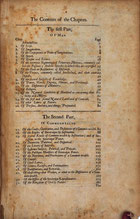
“The Register of Knowledge of Fact is called History.”
The First Part, Chapter 9, p. 40
Leviathan (1651)

Leviathan or The Matter, Forme and Power of a Common-Wealth Ecclesiasticall and Civil, commonly referred to as Leviathan, is a book written by Thomas Hobbes and published in 1651 . Its name derives from the biblical Leviathan. The work concerns the structure of society and legitimate government, and is regarded as one of the earliest and most influential examples of social contract theory. Leviathan ranks as a classic Western work on statecraft comparable to Machiavelli's The Prince. Written during the English Civil War , Leviathan argues for a social contract and rule by an absolute sovereign. Hobbes wrote that civil war and the brute situation of a state of nature could only be avoided by strong, undivided government.
“The Register of Knowledge of Fact is called History.”
The First Part, Chapter 9, p. 40
Leviathan (1651)
The Second Part, Chapter 22, p. 122 (See also: Secret society)
Leviathan (1651)
“Christian Kings may erre in deducing a Consequence, but who shall Judge?”
The Third Part, Chapter 43, p. 330
Leviathan (1651)
Lastly, the Pacts and Covenants, by which the parts of this Body Politique were at first made, set together, and united, resemble that Fiat, or the Let us make man, pronounced by God in the Creation.
The Introduction
Leviathan (1651)
The First Part, Chapter 4, p. 12 (See also: Julian Jaynes)
Leviathan (1651)
“And Beasts that have Deliberation, must necessarily also have Will.”
The First Part, Chapter 6, p. 28
Leviathan (1651)
“For such Truth as opposeth no man's profit nor pleasure is to all men welcome.”
Review and Conclusion, p. 396, (Last text line)
Leviathan (1651)
“No man's error becomes his own Law; nor obliges him to persist in it.”
The Second Part, Chapter 26, p. 144
Leviathan (1651)
“Men looke not at the greatnesse of the evill past, but the greatnesse of the good to follow.”
The First Part, Chapter 15, p. 76 (Italics as per text)
Leviathan (1651)